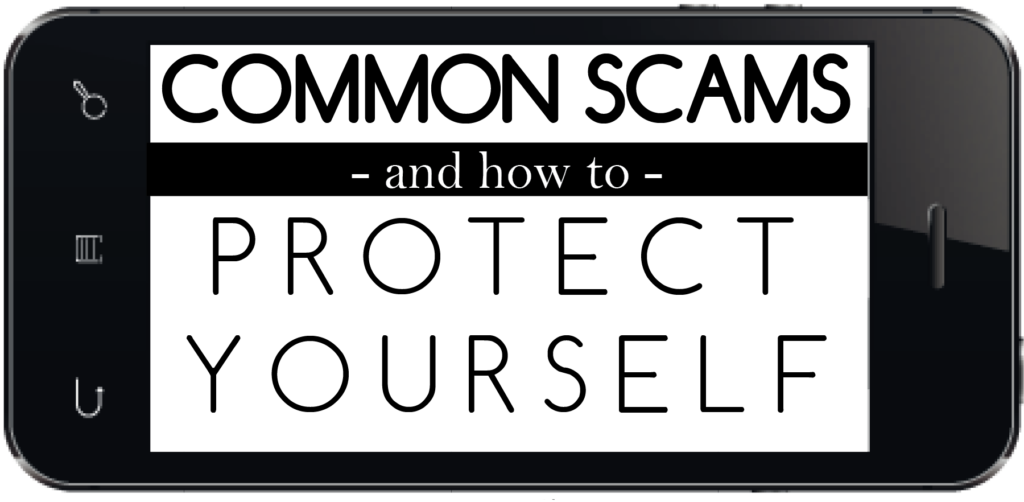“Attention: The IRS is filing a lawsuit against you…”
COMMON SCAMS AND HOW TO PROTECT YOURSELF
Information provided by usa.gov | Article by: Hannah Holbrook
IRS Imposter Scams
Has someone contacted you pretending to be work for the IRS? The imposter may have contacted you by phone, email, postal mail, or even a text message. It is important to be aware that are two common types of IRS imposter scams:
● Tax collection – You receive a phone call or letter, claiming that you owe taxes. They will demand that you pay the amount immediately often with a prepaid debit card or wire transfer. They may even threaten to arrest you if you don’t pay.
● Verification – You receive an email or text message that requires you to verify your personal information. The message often includes a hyperlink phrase “click here” or a button to a fraudulent form or website.
How to Report IRS Imposter Scams
Contact the Treasury Inspector General for Tax Administration (TIGTA) if you believe that an IRS imposter has contacted you. You can call TIGTA at 1-800-366-4484. Forward email messages that claim to be from the IRS to phishing@irs.gov.
Tips to Avoid IRS Imposter Scams
There are things to look out for to prevent being a victim of an IRS imposter scam.
Do:
- Beware if someone calls claiming to be from the IRS. The IRS will always contact you by mail before calling you about unpaid taxes.
- Ask a caller to provide their name and badge number and callback number. Then call TIGTA at 1-800-366-4484 to determine if the caller is an IRS employee with a legitimate need to contact you. If the person legitimately is from the IRS, call them back. Otherwise report it to the IRS.
- Become familiar with what fraudulent IRS email messages look like. You can review a sample IRS phishing emails online.
- Verify the number of the letter, form, or notice on the IRS website.
- Be suspicious of threats. The IRS won’t threaten to have police arrest you for not paying a bill.
Don’t:
- Don’t give in to demands to pay money immediately. Be especially suspicious of demands to wire money or pay with a prepaid debit card.
- Don’t trust the name or phone number on a caller ID display that shows “IRS.” Scammers often change the name that shows on caller ID.
- Don’t click on any links in email or text messages to verify your information.
Telephone Scams
Telephone scammers try to trick you out of money or get access to your personal information. Scams may come through phone calls from real people, robocalls, or text messages. The callers often make false promises, such as opportunities to buy products, invest your money, or receive free product trials. They may also offer you money through free grants and lotteries. Some scammers may call with threats of jail or lawsuits if you don’t pay them.
Report Telephone Scams
Reporting scams to federal agencies helps them collect evidence for lawsuits against people committing these scams. However, federal agencies don’t investigate individual cases of telephone scams.
- Report telephone scams to the Federal Trade Commission, either online or by phone at 1-877-382-4357. This is the primary government agency that collects scam complaints.
- Report all robocalls and unwanted telemarketing calls to the Do Not Call Registry.
- Report caller ID spoofing to the Federal Communications Commission either online or by phone at 1-888-225-5322.
Also report the scam to your state consumer protection office. Some consumer protection offices help residents resolve consumer problems.
How to Protect Yourself
Remember these tips to avoid being a victim of a telephone scam:
Do:
- Register your phone number with the National Do Not Call Registry. You may register by calling 1-888-382-1222. If you still receive telemarketing calls after registering, there’s a good chance that the calls are scams.
- Be wary of callers claiming that you’ve won a prize or vacation package.
- Hang up on suspicious phone calls.
- Be cautious of caller ID. Scammers can change the phone number that shows up on your caller ID screen. This is called “spoofing.”
- Research business opportunities, charities, or travel packages separately from the information the caller has provided.
Don’t:
- Don’t give in to pressure to take immediate action.
- Don’t say anything if a caller starts the call asking, “Can you hear me?” This is a common tactic for scammers to record you saying “yes.” Scammers record your “yes” response to use as proof that you agreed to a purchase or credit card charge.
- Don’t provide your credit card number, bank account information, or other personal information to a caller.
- Don’t send money if the caller tells you to wire money or pay with a prepaid debit card.
